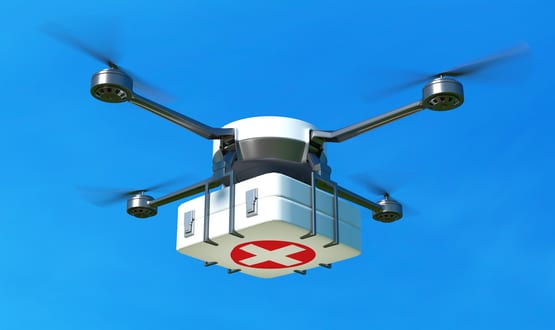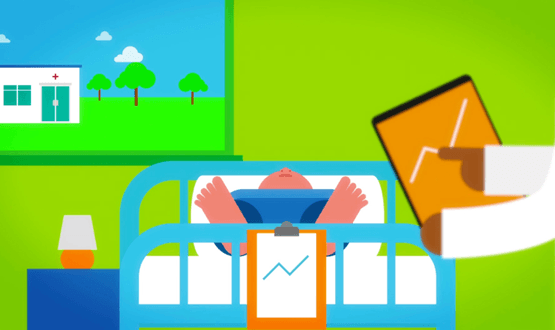PACS man
- 13 May 2014

The NHS-wide deployment of picture archiving and communications systems has been recognised by many as the greatest advance in radiology in a generation.
PACS and associated technologies have transformed the way images are booked and viewed, and opened up new possibilities for multi-disciplinary teamwork. Yet with them have associated challenges; not least sharing data securely within and between health communities.
The now disbanded National Programme for IT set out a strategy for PACS in England that included a central database in each its five regional clusters to enable the secure sharing of ‘any image, anywhere’ and provide online backup for radiology and diagnostic studies.
Back in 2008, however, this was still some way off (and, indeed, it never happened as planned). This left NHS organisations to find their own interim solutions, according to Dr Rhidian Bramley, the clinical director of radiology and chief clinical information officer at The Christie NHS Foundation Trust, which treats more than 40,000 cancer patients each year.
“To access images and reports generated in other trusts, we relied mainly on encrypted CDs,” says Dr Bramley, a past chair of the UK Imaging Informatics Group and clinical health informatics lead with NHS North West.
“This inevitably led to clinical incidents through delays in diagnosis and treatment whenever images weren’t available in a timely way at the point of care. As many as 20% of multi-disciplinary team reviews were being deferred because imaging was unavailable – often requiring it to be repeated.”
Tactical origins
Dr Bramley says the NHS chief executive’s guidance at the time recommended using remote web access and point-to-point data sharing to address the risks in sending images on portable media.
“To this end, we formed a clinical engagement group within the North West region to develop a tactical solution and maximise the benefits of PACS until the proposed spine-enabled Care Record Service strategic solution for image sharing became available.”
This project team first considered commercially available teleradiology products for pushing studies from one site to another; but being proprietary, these required everyone to have the same solution, says Dr Bramley. “The cost of acquiring one for each trust in the Northwest was therefore prohibitive.
“Moreover, having recently completed a national PACS procurement, there was little appetite for this approach. Instead, we turned to the digital imaging and communications in medicine (DICOM) standard, which enables images to be pushed quickly and cheaply between trusts.”
Following a successful test-run between The Christie and a neighbouring trust, the project team quickly set up some 450 point-to-point connections across the North West. After signing up to data sharing protocol agreements, this allowed everyone to transfer images anywhere essentially for free.
Seaside inspiration
“At the same time, we wanted to enable authorised personnel to access images and reports without having to wait for them to be pushed over,” says Dr Bramley. “In this regard, we were inspired by what had been achieved at Blackpool Victoria Hospital, the first site in the North West to implement PACS.
“They had made their web PACS available to the regional neurological centre down the road in Preston. This enabled clinicians at the centre to instantly view images of any Blackpool patient without having to wait for them to be transferred. We felt this was a great concept, but we needed a way of enabling it for every trust in the Northwest and allow them to share each other’s images securely.”
He says the answer was to build a web portal enabling registered users to log-on via remote web access to participating trusts’ PACS and view images. “It is a coordinated mechanism whereby worklists are created at both organisations for sign-off by their respective Caldicott Guardians, thereby ensuring a remote single-sign-on and legitimate relationship service.”
Furthermore, he says the service provides a full audit trail of clinical access backed by a service level agreement, while information governance is addressed by adherence to NHS image sharing policy and an NHS approved portal data sharing agreement.
Significant savings
Providing over 50 organisations in the North West with secure remote access to PACS images and reports, the portal now boasts more than 13,000 user accounts and 300,000 accesses a year.
Dr Bramley says it has made estimated cost savings of over £3m and delivered significant QIPP [quality, innovation, productivity and prevention, or efficiency savings] benefits in the process, by driving forward quality improvements in care and increasing efficiency.
Indeed, over 90% of respondents to a user survey claimed the portal saves them time or resource compared with other methods for reviewing images and reports. Meanwhile, an independent review commissioned by the Department of Health concluded that these savings more than met the cost of deploying the service.
Moreover, it found that the service improves patient safety, reduces time to diagnosis and treatment, improves diagnostic accuracy, reduces waiting times and improves the overall patient experience.
“We’ve also made the portal available to GPs so they can now access hospital imaging at their local trust. This makes it easier to discuss radiology studies with their patients or pick up on anything they feel consultants may have missed.”
Strategic service
The service currently costs less that 1p per imaging study accessed remotely – significantly less than the per study cost using existing teleradiology or image transfer service providers.
Dr Bramley says this cost benefit is amplified by savings in clinical staff time, reduction in PACS administration, more efficient use of network bandwidth, elimination of repeat imaging and the reduced cost of storing transferred imaging data.
Whilst the portal was originally envisaged as a tactical service for image transfer pending the availability of strategic solutions, he believes the change in national policy and promotion of clinical portals now aligns strongly with the PACS portal approach. He says it has now become a key strategic service supporting clinical pathways and delivering service improvement.
“Our model fits perfectly with current NHS strategy,” he says. “It opens the door for other areas of the country to join the service or establish their own clinical portals, emulating the IT-enabled change approach and lessons learned from our project.
“The single-sign-on approach and establishment of the portal as a legitimate relationship service to control and monitor remote access to clinical data is particularly useful in this context, and can be used to support access to other clinical services beyond imaging.”
Clinical engagement
All things considered, Dr Bramley believes the project’s success owes much to the use of agile methodologies, the strong clinical engagement of those involved, and a focus on patient safety.
He says it has facilitated clinical service redesign in cancer, trauma, stroke, paediatric and other networks, as well as helping establish cross-site clinical on-call rotas and supporting multi-disciplinary team meetings.
“The strategic potential of our approach is being realised through the development of sister portals that support regional referral services and provide access to clinical records in primary and secondary care across the cancer network.
“By enabling access to images in real-time from anywhere, portals like this reduce delays in clinical pathways, thereby improving communication and information flow between clinicians, GPs and those providing care in the community. This not only saves time, but also raises the levels of understanding around patients and their treatment,” he concludes.

There are 14 categories in the EHI Awards 2014 in association with CGI, the full details of which, along with information on how to enter, can be found on the dedicated awards website. The deadline for entries has been extended until Friday 16 May, so enter now – there will be no further extensions.
For information about sponsorship opportunities for the awards or to book tickets, contact EHI’s events team on 0207 785 6924.





